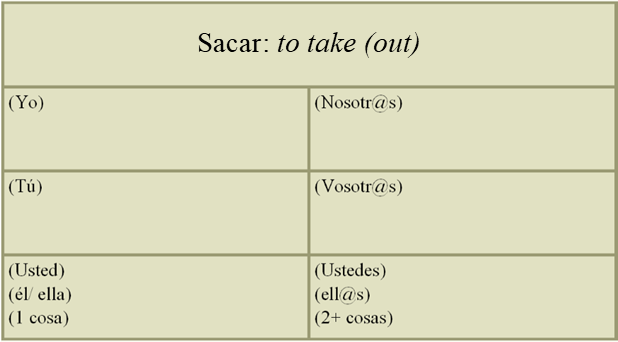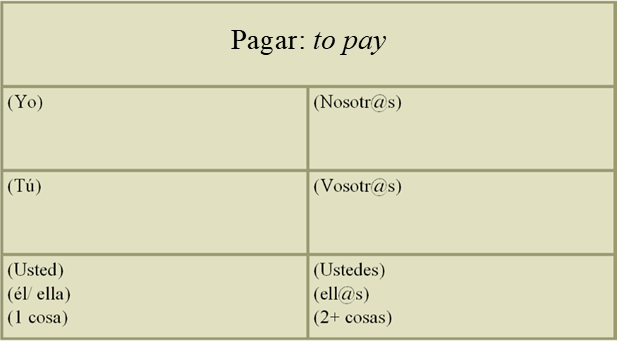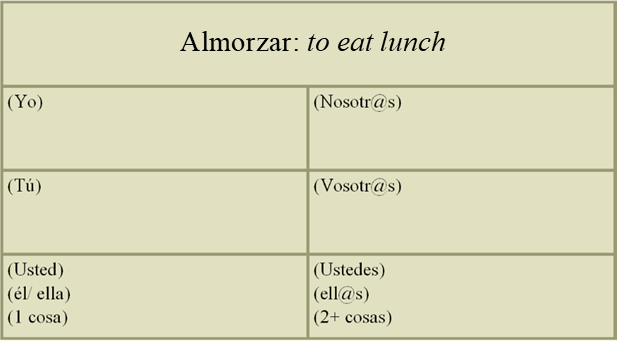9.5: Irregular Preterite Verbs, Part 1
- Page ID
- 44596
\( \newcommand{\vecs}[1]{\overset { \scriptstyle \rightharpoonup} {\mathbf{#1}} } \)
\( \newcommand{\vecd}[1]{\overset{-\!-\!\rightharpoonup}{\vphantom{a}\smash {#1}}} \)
\( \newcommand{\dsum}{\displaystyle\sum\limits} \)
\( \newcommand{\dint}{\displaystyle\int\limits} \)
\( \newcommand{\dlim}{\displaystyle\lim\limits} \)
\( \newcommand{\id}{\mathrm{id}}\) \( \newcommand{\Span}{\mathrm{span}}\)
( \newcommand{\kernel}{\mathrm{null}\,}\) \( \newcommand{\range}{\mathrm{range}\,}\)
\( \newcommand{\RealPart}{\mathrm{Re}}\) \( \newcommand{\ImaginaryPart}{\mathrm{Im}}\)
\( \newcommand{\Argument}{\mathrm{Arg}}\) \( \newcommand{\norm}[1]{\| #1 \|}\)
\( \newcommand{\inner}[2]{\langle #1, #2 \rangle}\)
\( \newcommand{\Span}{\mathrm{span}}\)
\( \newcommand{\id}{\mathrm{id}}\)
\( \newcommand{\Span}{\mathrm{span}}\)
\( \newcommand{\kernel}{\mathrm{null}\,}\)
\( \newcommand{\range}{\mathrm{range}\,}\)
\( \newcommand{\RealPart}{\mathrm{Re}}\)
\( \newcommand{\ImaginaryPart}{\mathrm{Im}}\)
\( \newcommand{\Argument}{\mathrm{Arg}}\)
\( \newcommand{\norm}[1]{\| #1 \|}\)
\( \newcommand{\inner}[2]{\langle #1, #2 \rangle}\)
\( \newcommand{\Span}{\mathrm{span}}\) \( \newcommand{\AA}{\unicode[.8,0]{x212B}}\)
\( \newcommand{\vectorA}[1]{\vec{#1}} % arrow\)
\( \newcommand{\vectorAt}[1]{\vec{\text{#1}}} % arrow\)
\( \newcommand{\vectorB}[1]{\overset { \scriptstyle \rightharpoonup} {\mathbf{#1}} } \)
\( \newcommand{\vectorC}[1]{\textbf{#1}} \)
\( \newcommand{\vectorD}[1]{\overrightarrow{#1}} \)
\( \newcommand{\vectorDt}[1]{\overrightarrow{\text{#1}}} \)
\( \newcommand{\vectE}[1]{\overset{-\!-\!\rightharpoonup}{\vphantom{a}\smash{\mathbf {#1}}}} \)
\( \newcommand{\vecs}[1]{\overset { \scriptstyle \rightharpoonup} {\mathbf{#1}} } \)
\(\newcommand{\longvect}{\overrightarrow}\)
\( \newcommand{\vecd}[1]{\overset{-\!-\!\rightharpoonup}{\vphantom{a}\smash {#1}}} \)
\(\newcommand{\avec}{\mathbf a}\) \(\newcommand{\bvec}{\mathbf b}\) \(\newcommand{\cvec}{\mathbf c}\) \(\newcommand{\dvec}{\mathbf d}\) \(\newcommand{\dtil}{\widetilde{\mathbf d}}\) \(\newcommand{\evec}{\mathbf e}\) \(\newcommand{\fvec}{\mathbf f}\) \(\newcommand{\nvec}{\mathbf n}\) \(\newcommand{\pvec}{\mathbf p}\) \(\newcommand{\qvec}{\mathbf q}\) \(\newcommand{\svec}{\mathbf s}\) \(\newcommand{\tvec}{\mathbf t}\) \(\newcommand{\uvec}{\mathbf u}\) \(\newcommand{\vvec}{\mathbf v}\) \(\newcommand{\wvec}{\mathbf w}\) \(\newcommand{\xvec}{\mathbf x}\) \(\newcommand{\yvec}{\mathbf y}\) \(\newcommand{\zvec}{\mathbf z}\) \(\newcommand{\rvec}{\mathbf r}\) \(\newcommand{\mvec}{\mathbf m}\) \(\newcommand{\zerovec}{\mathbf 0}\) \(\newcommand{\onevec}{\mathbf 1}\) \(\newcommand{\real}{\mathbb R}\) \(\newcommand{\twovec}[2]{\left[\begin{array}{r}#1 \\ #2 \end{array}\right]}\) \(\newcommand{\ctwovec}[2]{\left[\begin{array}{c}#1 \\ #2 \end{array}\right]}\) \(\newcommand{\threevec}[3]{\left[\begin{array}{r}#1 \\ #2 \\ #3 \end{array}\right]}\) \(\newcommand{\cthreevec}[3]{\left[\begin{array}{c}#1 \\ #2 \\ #3 \end{array}\right]}\) \(\newcommand{\fourvec}[4]{\left[\begin{array}{r}#1 \\ #2 \\ #3 \\ #4 \end{array}\right]}\) \(\newcommand{\cfourvec}[4]{\left[\begin{array}{c}#1 \\ #2 \\ #3 \\ #4 \end{array}\right]}\) \(\newcommand{\fivevec}[5]{\left[\begin{array}{r}#1 \\ #2 \\ #3 \\ #4 \\ #5 \\ \end{array}\right]}\) \(\newcommand{\cfivevec}[5]{\left[\begin{array}{c}#1 \\ #2 \\ #3 \\ #4 \\ #5 \\ \end{array}\right]}\) \(\newcommand{\mattwo}[4]{\left[\begin{array}{rr}#1 \amp #2 \\ #3 \amp #4 \\ \end{array}\right]}\) \(\newcommand{\laspan}[1]{\text{Span}\{#1\}}\) \(\newcommand{\bcal}{\cal B}\) \(\newcommand{\ccal}{\cal C}\) \(\newcommand{\scal}{\cal S}\) \(\newcommand{\wcal}{\cal W}\) \(\newcommand{\ecal}{\cal E}\) \(\newcommand{\coords}[2]{\left\{#1\right\}_{#2}}\) \(\newcommand{\gray}[1]{\color{gray}{#1}}\) \(\newcommand{\lgray}[1]{\color{lightgray}{#1}}\) \(\newcommand{\rank}{\operatorname{rank}}\) \(\newcommand{\row}{\text{Row}}\) \(\newcommand{\col}{\text{Col}}\) \(\renewcommand{\row}{\text{Row}}\) \(\newcommand{\nul}{\text{Nul}}\) \(\newcommand{\var}{\text{Var}}\) \(\newcommand{\corr}{\text{corr}}\) \(\newcommand{\len}[1]{\left|#1\right|}\) \(\newcommand{\bbar}{\overline{\bvec}}\) \(\newcommand{\bhat}{\widehat{\bvec}}\) \(\newcommand{\bperp}{\bvec^\perp}\) \(\newcommand{\xhat}{\widehat{\xvec}}\) \(\newcommand{\vhat}{\widehat{\vvec}}\) \(\newcommand{\uhat}{\widehat{\uvec}}\) \(\newcommand{\what}{\widehat{\wvec}}\) \(\newcommand{\Sighat}{\widehat{\Sigma}}\) \(\newcommand{\lt}{<}\) \(\newcommand{\gt}{>}\) \(\newcommand{\amp}{&}\) \(\definecolor{fillinmathshade}{gray}{0.9}\)· El pretérito has many irregular verbs. The first group we will see are verbs that end in –CAR, -GAR, or –ZAR (or “CAR-GAR-ZAR’s” for short).
à These verbs take a spelling change in the ‘yo’ form only.
à All other forms of the verb are regular (it is the é ending of the yo form that is the reason for these changes).
· While stem-changes are noted for some verbs below, remember that –AR verbs do not stem-change in the preterite.
· A helpful memory trick is to remember that “CAR-GAR-ZAR’s get QUÉ-GUÉ-CÉ’s.”
|
The yo form of –CAR verbs is “-qué.” This is to keep the hard “kuh” sound from the original infinitives, like sacar.
All other forms of the verb are regular |
Common –CAR verbs: Buscar……………….To look for/ to search for Practicar……………………..…….To practice Sacar……………………….....…….To take out Tocar……………..…….To play an instrument Explicar……………….….......…….To explain Equivocarse…To make a mistake/ to be wrong |
|
The yo form of –GAR verbs is “-gué.” This is to keep the hard “guh” sound from the original infinitives, like pagar.
All other forms of the verb are regular. |
Common –GAR verbs: Pagar……………….….......………..….To pay Jugar (u:ue)......…….To play a sport or a game Llegar.......…….To arrive/ to “get” somewhere Colgar (o:ue) ……….….......……...To hang up Castigar……………….….......……...To punish Apagar……………….….......…..….To turn off |
|
The yo form of –ZAR verbs is “-cé.” This change happens so we don’t break the spelling rule that doesn’t allow z-e when we put the é ending on the yo form. All other forms of the verb are regular. |
Common –ZAR verbs: Almorzar (o:ue)..……….......…….To eat lunch Empezar (e:ie)………………….To start/ begin Cruzar………………………......…….To cross Rezar……………………...….......…….To pray Alcanzar ………….To reach/ to achieve a goal Abrazar…………….......…….To hug/ embrace |
Actividad 15
Foundations. First, conjugate the verbs sacar, pagar, and almorzar. Then, fill in the blanks to complete the sentences below.






Actividad 16
Rellenar el espacio. Using el pretérito, fill in the blank with the correct form of the verbs provided.
1. Ayer, mi esposo ________ (tocar) la guitarra y yo ________ (tocar) el piano.
2. El lunes pasado, tres estudiantes ________ (llegar) tarde, pero yo ________ (llegar) a tiempo.
3. El trimestre pasado, yo ________ (buscar) un libro en la biblioteca y no lo encontré. Después, el bibliotecario lo ________ (buscar) y lo encontró fácilmente.
4. Ayer, yo ________ (almorzar) un sándwich de jamón y queso y mis amigos ________ (almorzar) pizza.
5. Anoche, mi novia ________ (pagar) la cuenta en el restaurante porque yo la ________ (pagar) el fin de semana pasado.
6. Mijo, yo ya te lo ________ (explicar) y tu padre te lo ________ (explicar) también – NO PUEDES TENER UNA RATA COMO MASCOTA.

Actividad 17

Un juego: Rompe-ladrillos.
First, pair up with a classmate. Then, you will need a “dado,” a die (or a phone app that will roll dice for you). Each partner should roll the die once to determine who will take the first turn. The person who rolls the highest number will be Jugador A.
El objetivo:
Break as many bricks as possible. Extra points are earned for breaking bricks side-to-side and top-to-bottom.
A jugar:
Player A starts! The game board is located in the appendix at the back of the book.
You will roll the die once to discover which verb you need to conjugate. A second roll of the die will tell you which form of the verb you need to use. The corresponding numbers are at the bottom of this sheet.
In Spanish, say a number in the brick wall, trying to win that brick. If you say the number in English, you lose your turn. Roll the dice and conjugate the verb out loud. Your partner will be the judge of your conjugation, but if there is any doubt, call over your instructor. If you conjugate the verb correctly, you color in that brick. Jugador A and Jugador B should use different colored pens or markers.
Now it’s Player B’s turn!
A ganar:
Once all of the bricks are broken, you get 1 point for each brick that you broke. Then, you get 3 bonus points if you break a set of bricks that connects your side to your opponent’s side, and 5 bonus points if you break a complete top-to-bottom column of 5 bricks.
Tiro 1:
1 Buscar
2 Explicar
3 Llegar
4 Pagar
5 Almorzar
6 Empezar
Tiro 2:
1 Yo
2 Tú
3 Usted/ él/ ella
4 Nosotr@s
5 Vosotr@s
6 Ustedes/ ellos/ ellas



